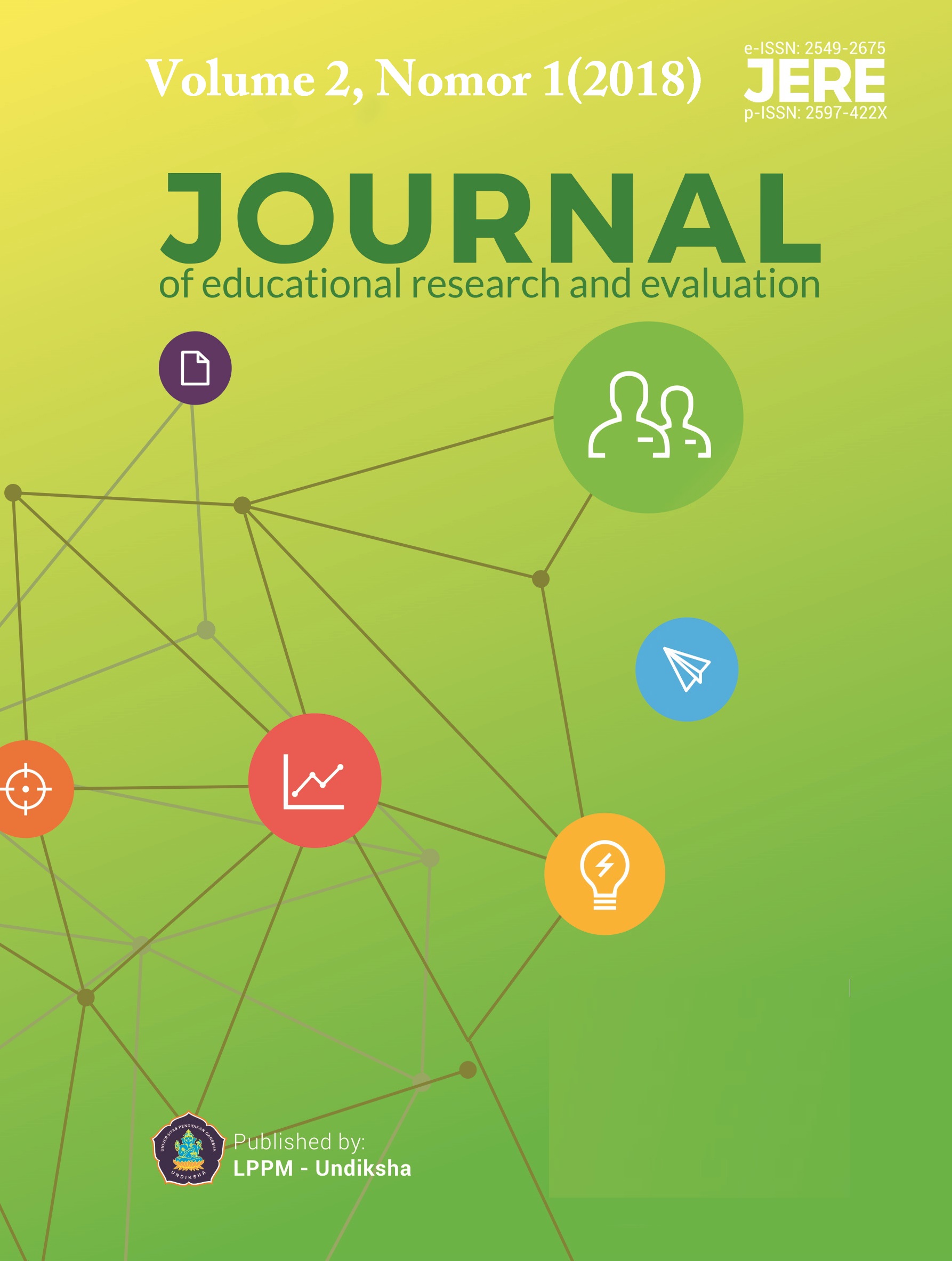EFFECT OF PROBLEM SOLVING LEARNING MODEL ON STUDENTS ACHIEVEMENT
DOI:
https://doi.org/10.23887/jere.v2i1.12558Keywords:
Learning model, problem solving, students achievementAbstract
This research aims to determine the difference in student achievement that used problem solving learning model and conventional learning model. The type of research was quasi experimental. The research was conducted at SMP N 11 Manokwari. The sampling technique used purposive sampling. A number of the sample the control group of 31 students and the experimental group of 30 students. Data analysis used independent t-test at significant level 0,05 with help of SPSS 22 for Windows program. The results showed that there was a difference in the student achievement (P = 0,000 <0.05), where the N-Gain value of experimental group was 0.4 and the control group was 0.3. The conclusion, there is a difference in the improvement of student achievement, where the students who learn by using the problem solving learning model higher the improvement of student achievement compared to the students who learn by using the conventional learning model.
References
Aisya, N., Corebima, A. D., & Mahanal, S. (2017). Hubungan antara Pretest dengan Posttest Keterampilan Berpikir Berpikir Siswa SMA pada Pembelajaran Biologi Kelas X Melalui Model Pembelajaran RQA Dipadu CPS Di Kota Malang. Prosiding Seminar Nasional Pendidikan Sains 2017 & Rakor PPI Jawa Tengah dengan Sekjen PPI (pp. 172-177). Surakarta: Universitas Sebelas Maret. Retrieved from http://jurnal.fkip.uns.ac.id/index.php/snps/article/view/11410
Baransano, A. Y., Yohanita, A. M., & Damopolii, I. (2017). Penerapan Model Pembelajaran Picture and Picture untuk Meningkatkan Hasil Belajar Biologi Siswa Kelas XI IPA SMA YABT Manokwari. Prosiding Seminar Nasional MIPA II Tahun 2017 (pp. 273-280). Manokwari: Sinar Grafika.
Çaliskan, S., & Selçuk, G. S. (2010). Pre-service Teachers’ Use of Self-regulation Strategies in Physics Problem Solving: Effects of gender and academic achievement. International Journal of the Physical Sciences, 5(12), 1926-1938.
Damopolii, I. (2018). Hubungan Motivasi Belajar dengan Hasil Belajar Biologi Siswa Di SMP 21 Rendani Manokwari. Seminar Nasional dan Kongres HPPBI (pp. 1-5). Mataram: https://osf.io/4twg2.
Damopolii, I., Hasan, A., & Kandowangko, N. (2015). Pengaruh Strategi Pembelajaran Inkuiri Bebas Dimodifikasi dan Kemampuan Memecahkan Masalah terhadap Keterampilan Proses Sains Mahasiswa Pada Praktikum Fisiologi Tumbuhan. Pancaran Pendidikan, 4(3), 191-200.
Djamarah, S. B., & Zain, A. (2010). Strategi Belajar Mengajar. Jakarta: Rineka Cipta.
Dogru, M. (2008). The Application of Problem Solving Method on Science Teacher Trainees on The Solution of the Environmental Problems. Journal of Environmental & Science Education, 3(1), 9-18.
Fajriah, F., Rahmatan, H., & Halim, A. (2017). Dampak Model Pembelajaran Problem solving terhadap Motivasi dan Hasil Belajar Peserta Didik Di SMP. Jurnal Pendidikan Sains Indonesia, 5(2), 87-94.
Firli, A., Rismayani, A., Sitorus, P. M. T., & Manuel, B. (2017). Implementing Mixed Method of Peer Teaching and Problem Solving on Undergraduate Students. Journal of Education Research and Evaluation, 1(1), 1-5.
Gök, T., & Sılay, İ. (2010). The Effects of Problem Solving Strategies on Students’ Achievement, Attitude and Motivation. Lat. Am. J. Phys. Educ., 4(1), 7-21.
Prastyawan. (2011). Inovasi Kurikulum dan Pembelajaran. Al-HIKMAH, 1(2), 170-181.
Raehanah, R., Mulyani, S., & Saputro, S. (2016). Efektivitas Model Pembelajaran Problem Solving Tipe Search Solve Create and Share (SSCS) dan Cooperatif Problem Solving (CPS) Ditinjau dari Kemampuan Matematis terhadap Prestasi Belajar. J. Pijar MIPA, XI(2), 75-80.
Riastini, P. N., & Mustika, I. K. (2017). Pengaruh Model Polya terhadap Kemampuan Memecahkan Masalah Matematika Siswa Kelas V SD. International Journal of Elementary Education, 1(3), 189-196.
Ristiasari, T., Priyono, B., & Sukaesih, S. (2012). Model Pembelajaran Problem Solving dengan Mind Mapping terhadap Kemampuan Berpikir Kritis Siswa. Unnes Journal of Biology Education, 1(3), 34-41.
Shoimin, A. (2014). 68 Model Pembelajaran Inovatif dalam Kuirkulum 2013. Yogyakarta: Ar-Ruzz Media.
Suprijono, A. (2010). Cooperative Learning Teori dan Aplikasi PAIKEM. Yogyakarta: Pustaka Belajar.
Sutarmi, K., & Suarjana, I. M. (2017). Peningkatan Hasil Belajar Siswa Menggunakan Metode Problem Solving dalam Pembelajaran. Jurnal Ilmiah Sekolah Dasar, 1(2), 75-82.
Tabrani, R. (2008). Cara Pembelajaran Matematika Seri I. Semarang: PT Bengawan Ilmu.
Toll, C. A. (2017). A Problem‐Solving Model for Literacy Coaching Practice. The Reading Teacher, 70(4), 413-421.
Yasin, R. M., Halim, L., & Ishar, A. (2012). Effects of Problem-solving Strategies in the Teaching and Learning of Engineering Drawing Subject. Asian Social Science, 8(16), 65-79.
Downloads
Published
How to Cite
Issue
Section
License
Authors who publish with the Journal of Evaluation and Research in Education (JERE) agree to the following terms:
- Authors retain copyright and grant the journal the right of first publication with the work simultaneously licensed under a Creative Commons Attribution License (CC BY-SA 4.0) that allows others to share the work with an acknowledgment of the work's authorship and initial publication in this journal.
- Authors are able to enter into separate, additional contractual arrangements for the non-exclusive distribution of the journal's published version of the work (e.g., post it to an institutional repository or publish it in a book), with an acknowledgment of its initial publication in this journal.
- Authors are permitted and encouraged to post their work online (e.g., in institutional repositories or on their website) prior to and during the submission process, as it can lead to productive exchanges, as well as earlier and greater citation of published work. (See The Effect of Open Access)











